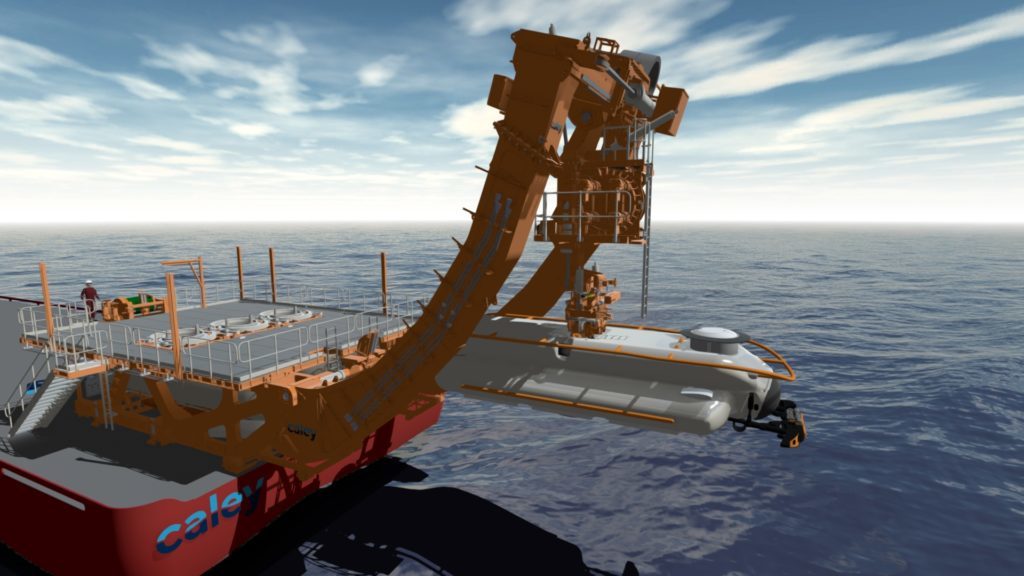
Part of the Seanamic Group, Caley Ocean Systems have been designing and manufacturing offshore handling systems for the energy, diving, defence and seismic sector for exactly half a century.
Despite being a seasoned outfit, what the firm have recently managed to do is to look to the future to make those systems more accessible to their customer base through the use of virtual reality.
Not only can you see how the product works, you can actually ‘virtually’ stand on the system and watch as a loading tower deploys heavy duty items connected to your industry.
“Where we are today, we’re able to use the latest tools and technology to allow us to be able to take, what is reasonably well proven and established technology, and develop the design in a 3D environment”, said Gregor McPherson, technical director at Caley.
“The key performance criterion for this equipment is its ability to be rapidly mobilised. In a sense what you’re doing by producing a fully developed detailed model is creating a situation where there are almost no hiding places. You can’t just say ‘don’t worry it’ll be alright on the night, guys’ because you can look at every last nut and bolt. You can see for yourself how it works.”
Caley produce the equipment, train those who buy it on how to use it, and provide them with a virtual reality world in which to understand and appreciate it.
Based in Glasgow, the firm have traditionally been involved with oil and gas markets but have transitioned part of the business to accommodate the burgeoning Scottish and international renewable energy sector.
“We’re the darling of quite a few areas, the renewables sector for us has been very good over the last three or four years” said managing director Douglas Morrison. “And we’re seeing enquiries coming in from all sorts of new energy for things like carousels, tensioners but also power generation systems.”
“It’s a mixture of wind farm and tidal companies. A normal renewables package for us can be anywhere from £2million to £6million.”
Celebrating its 50th birthday, Caley boast a significant portfolio when it comes to working within some of the best known names who’ve set their sail to business within the high seas.
“We have a number of steady clients” added Mr Morrison. “Part of our solid success comes from having that client base – with a high percentage of our revenue coming from repeat customers such as Technip, James Fisher and the Irish Navy.”
One of the major benefits for the offshore design and engineering firm comes from where they’re situated – Caley have the River Clyde virtually on their doorstep to trial and test designs and products.
They’ve cannily utilised the rich history and shipbuilding knowledge that still beats within Glasgow, while also exploiting the engineering and art school design culture that the city cultivates.
“It’s really where Caley’s business has been able to be formed from, in terms of local knowledge, local experience and the talent from local universities” said Mr Morrison.
“Logistically it puts us in quite a strong position supporting some of the international markets. There’s certainly a lot of experience that we have coming out of the shipyards. Historically we are still seeing that a lot of the skills are transferable.”
With a staff of around 45, half of those being engineers, it makes sense for the company to utilise the skills base that’s all around them, as Morrison pointed out:
“It’s a big part of Caley’s business in order to develop for the future. To bring [people] through and develop them, not only in the engineering side, but in some cases other aspects of the business such as project management or operations.”
As the world adapts to a rapidly changing energy sector, so too must business adapt to remain relevant, prosperous and productive.
Although the game may change, Douglas Morrison claims his business is ready to keep looking – virtually or otherwise – to the future:
“For us it’s about understanding what they market needs, that’s key. There’s no doubt that with all the market sectors we’re in, things are going to be challenging, we’re going to have to offer something different.”
Recommended for you
